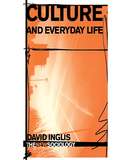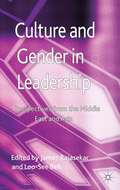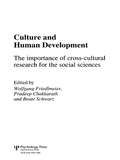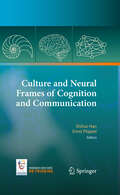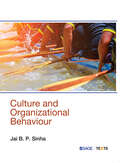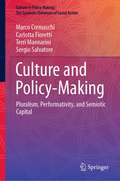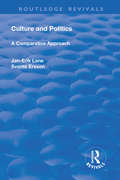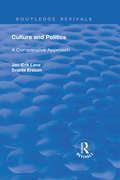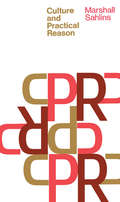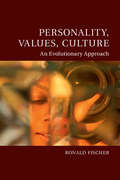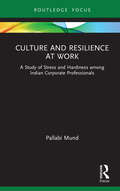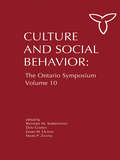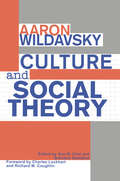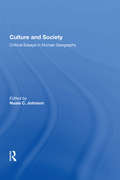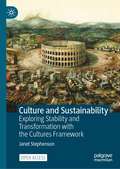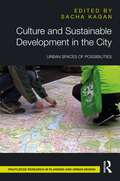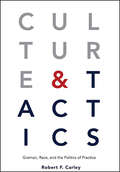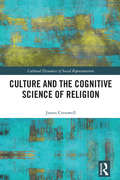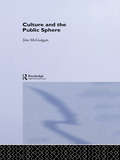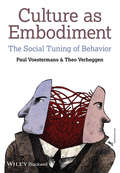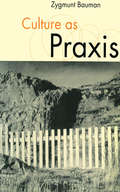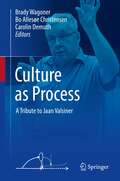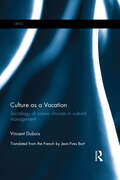- Table View
- List View
Culture and Everyday Life (The New Sociology)
by David InglisCulture is unquestionably a central topic in the contemporary social sciences. In order to understand how people think, feel, value, act and express themselves, it is necessary to examine the cultures they create, and are in turn created by. Here, David Inglis shows how the study of culture can be transformed by focusing in on how cultural forces shape, influence, structure - and occasionally disrupt - the day-to-day activities of individuals. Reconsidering different views on 'culture' - what it is, how it operates, and how it relates to other aspects of the human (and non-human) world - this new book covers key areas such as: high culture versus popular culture modern and postmodern culture globalization and culture culture and nature. Specific issues covered range from the everyday aspects of sportive play, artistic production and the mass media, to car culture and global cuisine, and students are introduced to some of the major thinkers on culture from Matthew Arnold to Bakhtin and Bourdieu. Written in a concise, student-friendly manner, theoretical arguments are illustrated with examples from film, architecture and daily life, making this an informative and indispensable introduction for those wishing to understand the complexities of culture.
Culture and Gender in Leadership
by James Rajasekar Loo-See BehThe overall aim of this volume is to present the research studies carried out in the Middle East and Asia in the fields of culture and gender and their influence on leadership in particular. The cultures and practices of these geographical regions are very much varied and this book, Culture and Gender in Leadership: Perspectives from the Middle East and Asia, brings together analyses of these themes in selected countries of these two regions. The chapter authors use detailed descriptions, case studies and vignettes to speak to the cultural relativism and gender in leadership in these countries and provide a unique and comparative perspective drawn from their own cultures. This volume also contributes to the development of theory and empirical research found in these regions and through the collective efforts presented in this book, attempts to strengthen the body of knowledge and practice in the fields of culture and gender in leadership. As Asia is becoming the engine of economic growth for the world and Arab Spring is opening up new vistas in the Middle East, this book is a must read.
Culture and Human Development: The Importance of Cross-Cultural Research for the Social Sciences
by Pradeep Chakkarath Wolfgang Friedlmeier Beate SchwarzAs intercultural encounters between people in the modern world become more common, important questions have been raised about the nature of culture-specific differences and similarities. Focusing on the relationship between culture and human development, this timely book offers an interdisciplinary exploration of key developmental processes. It combines psychological and sociological approaches with cross-cultural research to examine phenomena such as the transfer of culture between generations and the universality of attachment theory. Drawing on detailed research from a range of cultural groups, leading international researchers consider the impact of social change and modernization on the development of the individual and at the societal level. Theoretical and methodological issues are presented in terms of how to apply the results of cross-cultural research as well as recent empirical research done in specialized areas of the field. Finally, short-term intercultural exchanges are examined and used to suggest some of the potential practical uses of cross-cultural research for the future. This book will be essential reading for anyone studying or researching in cultural psychology, cross-cultural psychology, acculturation or behavioral development. It will also prove an invaluable source of information for anyone interested in sociology and the social sciences in general.
Culture and Neural Frames of Cognition and Communication (On Thinking #3)
by Ernst Pöppel Shihui HanCultural neuroscience combines brain imaging techniques such as functional magnetic resonance imaging and event-related brain potentials with methods of social and cultural psychology to investigate whether and how cultures influence the neural mechanisms of perception, attention, emotion, social cognition, and other human cognitive processes. The findings of cultural neuroscience studies improve our understanding of the relation between human brain function and sociocultural contexts and help to reframe the "big question" of nature versus nurture. This book is organized so that two chapters provide general views of the relation between biological evolution, cultural evolution and recent cultural neuroscience studies, while other chapters focus on several aspects of human cognition that have been shown to be strongly influenced by sociocultural factors such as self-concept representation, language processes, emotion, time perception, and decision-making. The main goal of this work is to address how thinking actually takes place and how the underlying neural mechanisms are affected by culture and identity.
Culture and Organizational Behaviour (SAGE Texts)
by Jai B SinhaCulture and Organizational Behaviour is a textbook for management studies that highlights the effect of the confluence of Western and Indian cultural influences. It adheres to the syllabi of the organizational behaviour courses followed in most major universities and management institutes. The book presents basic knowledge of organizational behaviour as developed in the West, adds to these the latest global research findings, and situates them in the Indian cultural perspective. It also highlights the issues that emanate from the interface of the Indian culture and organizational behaviour. Key Features: - Contains updated case studies from Indian organizations - Focuses on current and emerging strategies in organizational structures, leadership, power and politics - Covers topics like balancing work and other responsibilities, power and politics, and conflict and negotiation, which, though extremely crucial to organizational behaviour, have perhaps not got due attention in the existing literature - Presents the relatively unexplored effects of Indian culture on organizational behaviour. Provides a platform where both theoretical and practical issues can be addressed by managers, researchers, students and teachers alike.
Culture and Policy-Making: Pluralism, Performativity, and Semiotic Capital (Culture in Policy Making: The Symbolic Universes of Social Action)
by Sergio Salvatore Terri Mannarini Marco Cremaschi Carlotta FiorettiThis book advances the understanding and modelling of sensemaking and cultural processes as being crucial to the scientific study of contemporary complex societies. It outlines a dynamic, processual conception of culture and a general view of the role of cultural dynamics in policy-making, drawing three significant methodological implications: pluralism, performativity, and semiotic capital. It focuses on the theoretical and methodological aspects of the analysis of culture and its dynamics that could be applied to the developing of policymaking and, in general, to the understanding of social phenomena. It draws from the experience and data of a large-scale project, RECRIRE, funded by the H2020 program that mapped the symbolic universes across Europe after the economic crisis. It further develops the relationship between culture and policy-making discussed in two previous volumes in this series, and constitutes the ideal third and final element of this trilogy. The book is a useful tool for academics involved in studying cultural dynamics and for policy-oriented researchers and decision-makers attentive to the cultural dimensions of the design, implementation and reception of public policies.
Culture and Politics: A Comparative Approach
by Svante Ersson Lane Jan-ErikThis title was first published in 2002: Examining problems that have caused much debate within political science, this book seeks to identify a proper place for the analysis of culture and values within political science. It goes on to explore the impact of globalization upon society.
Culture and Politics: A Comparative Approach (Routledge Revivals)
by Lane Jan-Erik Svante O. ErssonThis title was first published in 2002: Examining problems that have caused much debate within political science, this book seeks to identify a proper place for the analysis of culture and values within political science. It goes on to explore the impact of globalization upon society.
Culture and Power in the Classroom: Educational Foundations for the Schooling of Bicultural Students (Series in Critical Narrative)
by Antonia DarderThis is a timely second edition of the enormously significant book which changed how teachers and community activists view their own practice. This edition concludes with personal essays by teachers, professors, and community activists explaining the direct impact which Culture and Power in the Classroom has had on their lives. Unlike many texts that discuss educational failure, this book provides a historical context for understanding underachievement in our nation. Thoroughly revised to include the new thinking on diversity and learning, this edition includes a new chapter on assessment and the brain. This second edition will be welcomed by previous and new readers alike, and will help influence the approach of a new generation of teachers, whether they are based in schools, colleges or community centres.
Culture and Practical Reason
by Marshall Sahlins"The main thrust of this book is to deliver a major critique of materialist and rationalist explanations of social and cultural forms, but the in the process Sahlins has given us a much stronger statement of the centrality of symbols in human affairs than have many of our 'practicing' symbolic anthropologists. He demonstrates that symbols enter all phases of social life: those which we tend to regard as strictly pragmatic, or based on concerns with material need or advantage, as well as those which we tend to view as purely symbolic, such as ideology, ritual, myth, moral codes, and the like. . . ."—Robert McKinley, Reviews in Anthropology
Culture and Psychology: An Evolutionary Approach (Culture and Psychology)
by Ronald FischerHumans are complex social beings. To understand human behaviour, an integrated perspective is required - one which considers both what we regularly do (our personality traits) and what motivates us (our values). Personality, Values, Culture uses an evolutionary perspective to look at the similarities and differences in personality and values across modern societies. Integrating research on personality and human values into a functional framework that highlights their underlying compatibilities (driven by shared genetic and brain mechanisms), Fischer describes how personality is shaped by the complex interplay between genes and the environment, both over the course of human evolution and within the lifespan of individuals. He proposes a gene-culture coevolution model of personality and values to explain how and why people differ around the world and how genes, economics, social conditions, and climate jointly shape personality.
Culture and Resilience at Work: A Study of Stress and Hardiness among Indian Corporate Professionals (Routledge Focus on Business and Management)
by Pallabi MundIn 1979, Suzanne C. Kobasa propounded her theory of "hardiness" where she hypothesized her 3Cs: Commitment, Control, and Challenge, as the basic ingredients of hardiness that make an individual stress resilient. She was one of the early researchers who paid attention to personality features and illustrated that individuals who experience high level of stress without mental and physical illness have a different personality from those who become ill in stressful conditions. In current times, the discourse has enjoyed a sustained scholarly interest but there is hardly any study on the corporate professionals or the Indian context. Since the early 1990s, India has joined the corporate world and has been a fast-developing country. This changed state of affairs provides a broader scope of study on hardy personality in coping with stress in the Indian context. This book examines the efficacy of hardiness on the Indian corporate professionals in the post-globalization scenario. It endeavours to situate Kobasa’s foundational theorisation along with those offered by other scholars in the context of the contemporary life situations with a focus on India. It presents a hypothesis that in the Indian context, culture could be looked upon as yet another basic component of hardiness. Culture and Resilience at Work offers an assessment of the significant contribution of Indian culture as one of the major contributing components in enhancing hardiness in corporate professionals. It will be of interest to researchers, academics, professionals, and students in the fields of stress management, human resource management, social psychology, culture studies, and organizational behaviour.
Culture and Social Behavior: The Ontario Symposium, Volume 10 (Ontario Symposia on Personality and Social Psychology Series #Vol. 10)
by Dov Cohen James M. Olson Mark P. Zanna Richard M. SorrentinoCross-cultural differences have many important implications for social identity, social cognition, and interpersonal behavior. The 10th volume of the Ontario Symposia on Personality and Social Psychology focuses on East-West cultural differences and similarities and how this research can be applied to cross-cultural studies in general.Culture and Social Behavior covers a range of topics from differences in basic cognitive processes to broad level cultural syndromes that pervade social arrangements, laws, and public representations. Leading researchers in the study of culture and psychology describe their work and their current perspective on the important questions facing the field. Pioneers in the field such as Harry Triandis and Michael Bond present their work, along with those who represent some newer approaches to the study of culture. Richard E. Nisbett concludes the book by discussing the historical development of the field and an examination of which aspects of culture are universal and which are culture-specific. By illustrating both the diversity and vitality of research on the psychology of culture and social behavior, the editors hope this volume will stimulate further research from psychologists of many cultural traditions.Understanding cultural differences is now more important than ever due to their potential to spark conflict, violence, and aggression. As such, this volume is a "must have" for cultural researchers including those in social, cultural, and personality psychology, and interpersonal, cultural, and political communication, anthropology, and sociology.
Culture and Social Theory
by Aaron WildavskyAaron Wildavsky, along with Mary Douglas, identified what they called grid-group theory. Wildavsky began calling this "cultural theory," and applied it to an astounding array of subjects. The essays in this volume exemplify the theory's potential contributions to three seemingly disparate, but related, areas: the social construction of meaning, normative/analytic political philosophy, and a theory of rational choices. This book is the first in a series of Aaron Wildavsky's collected writings being published posthumously by Transaction. Wildavsky selected, sequenced, and grouped all but three of the essays included in Culture and Social Theory prior to his death. Some are presented here for the first time. Wildavsky's cultural theory provides ways to organize and interpret the world.In the first section, he shows how social scientists, particularly economists and sociologists, apply the theory. Wildavsky argues that concepts such as externalities, public goods, altruism, and even risk and rape are tools of rival, ubiquitous cultures engaged in perpetual struggle with one another. The second section deals with cultural theory as a way to interpret the works of normative and analytic political philosophers, including Thomas Hobbes and John Stuart Mill, on competing human objectives. Wildavsky argues that particular types of interaction among a society's cultures are necessary for effective realization of basic concepts such as democracy. In the third section, Wildavsky applies cultural theory in conjunction with instrumental rationality, the former as a theory of preference formation, the latter as a device for realizing preferences efficiently. High-priority objectives, and thus the character of norms and rational action, shift across cultures. The world and its various elements comprise a complex, frequently changing, and thus ambiguous reality, nowhere more so than in the dynamic contours of the United States. For cultural theory, individualistic, hierarchical, and egalitarian interpretations of the world are the only ones capable of forming and sustaining institutions and related patterns of social relations that will support human social groups.Wildavsky's central objective is to strip away the camouflage and to reveal varying domains of social life as fields of cultural competition. Culture and Social Theory will be a necessary addition to the libraries of political scientists, economists, and policymakers, not to mention all those who admire Aaron Wildavsky and his work.
Culture and Society: Critical Essays in Human Geography
by Nuala C. JohnsonHuman geographers have been at the forefront of research that examines the relationships between space, culture and society. This volume contains twenty-one essays, published over the past thirty years, that are iconic instances of this investigative field. With a focus on four broad themes - landscape, identity, colonialism, nature - these essays represent some of the best and most innovative interventions that geographers have made on these topics. From the visual to the corporeal, from rural Ceylon to urban America and from the sixteenth century to the twenty-first, this volume brings together a set of theoretically sophisticated and empirically grounded works.
Culture and Sustainability: Exploring Stability and Transformation with the Cultures Framework
by Janet StephensonThis Open access book brings a cultural lens, and a distinctive analytical framework, to the problem of transitioning to a sustainable, low-carbon future. The world faces a seemingly impossible hurdle – to radically alter long-established social, economic and technological systems in order to live within the biophysical limits of the globe, while ensuring a just and enduring transition. The overarching premise of this book is that this cannot be achieved without widespread cultural change. ‘We need a change in culture’ is often used rhetorically, but what does this really mean?Stephenson starts by exploring culture’s elusiveness, describing its divergent interpretations before identifying core features of culture that are common across most definitions. These characteristics form the core of the cultures framework, an extensively tested approach to studying the links between culture and sustainability outcomes. The framework makes culture an accessible concept which can be analytically applied to almost any sustainability problem. Using many examples from around the world, Stephenson illustrates how cultural stability, cultural flexibility and cultural transformation all have a part to play in the sustainability transition. She guides the reader in the use of the cultures framework for policy development and to underpin research undertaken by individuals or by multi-disciplinary teams.Clearly and engagingly written, Culture and Sustainability is essential reading for academics, students, policy makers and indeed anyone interested in a sustainable future.
Culture and Sustainable Development in the City: Urban Spaces of Possibilities
by Sacha KaganThis book exposes the potential to advance a cultural approach to sustainable urban development. It explores urban "spaces of possibilities" and links them to the seized or missed opportunities for innovative forms of transversal partnerships throughout the city and of culturally sensitive urban policies. The call for sustainability brings with it challenges for which, in view of the urgency of social transformation, institutional innovations are necessary. Sustainable urban development will only succeed through creative impulses, experiments, trying out innovative ideas, and making alternatives visible, in particular through locally rooted urban initiatives, artistic actions, and social movements. Discussing many concrete examples from several years of empirical research in the cities of Hanover and Hamburg (Germany), Baltimore and Chicago (USA), Bangalore (India), St. Petersburg (Russia), Singapore, and Vancouver (Canada), the book connects urban spaces and their actors; looks at their guiding principles, strategies, and concrete practices; and identifies new levers, networks, and alliances. Readers will find in this book not only inspiring examples of culture in everyday life in the city but also explanations about the qualities that make local cultural initiatives especially full of potentials, and how they may translate into city-wide changes, engaging with the whole City as Space of Possibilities. The book will interest researchers and advanced students in the interdisciplinary fields of urban studies, sustainability science/sustainability research, cultural sciences, urban sociology, and sociology of the arts/cultural sociology; and those interested in the transdisciplinary collaborations between the arts, academia, and civil society.
Culture and Sustainable Development in the City: Urban Spaces of Possibilities (Routledge Research in Planning and Urban Design)
by Sacha KaganThis book exposes the potential to advance a cultural approach to sustainable urban development. It explores urban "spaces of possibilities" and links them to the seized or missed opportunities for innovative forms of transversal partnerships throughout the city and of culturally sensitive urban policies.The call for sustainability brings with it challenges for which, in view of the urgency of social transformation, institutional innovations are necessary. Sustainable urban development will only succeed through creative impulses, experiments, trying out innovative ideas, and making alternatives visible, in particular through locally rooted urban initiatives, artistic actions, and social movements. Discussing many concrete examples from several years of empirical research in the cities of Hanover and Hamburg (Germany), Baltimore and Chicago (USA), Bangalore (India), St. Petersburg (Russia), Singapore, and Vancouver (Canada), the book connects urban spaces and their actors; looks at their guiding principles, strategies, and concrete practices; and identifies new levers, networks, and alliances. Readers will find in this book not only inspiring examples of culture in everyday life in the city but also explanations about the qualities that make local cultural initiatives especially full of potentials, and how they may translate into city-wide changes, engaging with the whole City as Space of Possibilities.The book will interest researchers and advanced students in the interdisciplinary fields of urban studies, sustainability science/sustainability research, cultural sciences, urban sociology, and sociology of the arts/cultural sociology; and those interested in the transdisciplinary collaborations between the arts, academia, and civil society.
Culture and Tactics: Gramsci, Race, and the Politics of Practice (SUNY series, Praxis: Theory in Action)
by Robert F. CarleyWhile scholars of social and political movements tend to analyze tactics in terms of their effectiveness in achieving specific outcomes, Robert F. Carley argues by contrast that tactics are, above all, what social movements do. They are not mere means to an end so much as they are a public form of expression pointing out injustices and making just demands. Rooted in a highly original analysis of the tactically mediated relationship between race and mobilization in the work of Italian philosopher and revolutionary Antonio Gramsci, Culture and Tactics demonstrates how tactics impact the organizational structures of social movements and expand the affinities of political communities. Carley looks at how Gramsci used innovative tactics to bridge perceptions of racial differences between factory workers and subaltern groups, the latter having been denigrated to the point of subhumanity by a complex Italian national racial economy. Newly envisioning Gramsci as a theorist of race within a broader context of social struggle, Carley connects Gramsci's insights into the political mobilizations of racialized subaltern groups to contemporary critical race theory and cultural studies of racialization and racism. Speaking across disciplines and drawing on a number of empirical examples, Carley offers a battery of original concepts to assist scholars and activists in analyzing the tactical practices of protests in which race is a central factor.
Culture and the Cognitive Science of Religion (Cultural Dynamics of Social Representation)
by James CresswellCulture and the Cognitive Science of Religion is the first book to bring together cultural psychology and the cognitive science of religion (CSR). Containing much-needed discussion of how good research should do more than simply follow methodological prescriptions, this thought-provoking and original book outlines the ways in which CSR can be used to study everyday religious belief without sacrificing psychological science. Cresswell’s pragmatist approach expands CSR in a radically new direction. The author shows how language and culture can be integrated within CSR in order to achieve an alternative ontogenetic and phylogenetic approach to cognition, and argues that a view of cognition that is not based on modularity, but on the dynamic connection between an organism and its milieu, can lead to a view of evolution that makes much more room for the constitutive role of culture in cognition. As a provocative attempt to persuade researchers to engage with religious communities more directly, the book should be essential reading for academics, researchers and postgraduate students, as well as psychologists interested in the cognitive science of religion, theological anthropology, religious studies and cultural anthropology.
Culture and the Public Sphere
by Jim McGuigan Dr Jim McguiganJim McGuigan discusses cultural policy as a manifestation of cultural politics in the widest sense. Illustrating his case with examples from recent cultural policy initiatives in Britain, the United States and Australia, he looks at:* The rise of market reasoning in arts administration* Urban regeneration and the arts* Heritage tourism* Race, identity and cultural citizenship* Censorship and moral regulation* The role of computer-mediated communication in democratic discourse
Culture as Embodiment
by Paul Voestermans Theo VerheggenCulture as Embodiment utilizes recent insights in psychology, cognitive, and affective science to reveal the cultural patterning of behavior in group-related practices.Applies the best of the behavioural sciences to contemporary issues of behavioural cross-fertilization in global exchangePresents an original theory to be used in the gender and integration debates, about what the acceptance of newcomers from different cultural backgrounds really entailsPresents a theory that is also applicable to youth culture and the split in modern society between underclass, modal class, and the eliteContains an original approach to the persistence of religion, and relates religious thought to the cognitive capacity of generic belief
Culture as Praxis (Published in association with Theory, Culture & Society)
by Zygmunt BaumanIn this major work, Zygmunt Bauman seeks to classify the meanings of culture. He distinguishes between culture as a concept, culture as a structure and culture as praxis and analyzes the different ways in which culture has been used in each of these settings. For Bauman, culture is a living, changing aspect of human interaction which must be understood and studied as a universal of human life. At the heart of his approach is the proposition that culture is inherently ambivalent. With a major new introduction to this new edition, this classic work emerges as a crucial link in the development of Bauman's thought. By his own admission, it was the first of his books to grope towards a new kind of social theory, in contrast to the false certainties and gross theorems that dominated much of the post-war period. This is Bauman at his best, at his most subtle and his most searching.
Culture as Process: A Tribute to Jaan Valsiner
by Brady Wagoner Bo Allesøe Christensen Carolin DemuthJaan Valsiner has made numerous contributions to the development of psychology over the last 40 years. He is internationally recognized as a leader and innovator within both developmental psychology and cultural psychology, and has received numerous prizes for his work: the Alexander von Humboldt prize, the Hans Killian prize, and the Outstanding International Psychologist Award from the American Psychological Association. Having taught at Universities in Europe, Asia and north and south America, he is currently Niels Bohr professor at Aalborg University, Denmark. This book is the first to discuss in detail the different sides of Valsiner’s thought, including developmental science, semiotic mediation, cultural transmission, aesthetics, globalization of science, epistemology, methodology and the history of ideas. The book provides an overview, evaluation and extension of Valsiner’s key ideas for the construction of a dynamic cultural psychology, written by his former students and colleagues from around the world.
Culture as a Vocation: Sociology of career choices in cultural management (CRESC)
by Vincent DuboisVocational occupations are attractive not so much for their material rewards as for the prestige and self-fulfillment they confer. They require a strong personal commitment, which can be subjectively experienced in terms of passion and selflessness. The choice of a career in the cultural sector provides a good example of this. What are the terms of this calling? What predisposes individuals to answer it? What are the meanings of such a choice? To answer these questions, this book focuses on would-be cultural managers. By identifying their social patterns, by revealing the resources, expectations and visions of the world they invest in their choice, it sheds new light on these occupations. In these intermediary and indeterminate social positions, family heritages intersect with educational strategies, aspirations of upward mobility with tactics against downward mobility, and social critique with adjustment strategies. Ultimately the study of career choices in cultural management suggests a new take on the analysis of social reproduction and on the embodiment of the new spirit of capitalism. The empirical findings of this research conducted in France are set in a broader comparative perspective, at the European level and with the USA.
